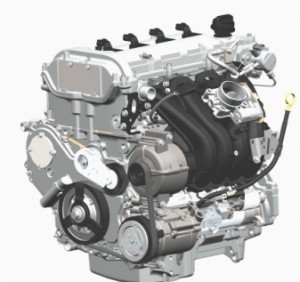The U.S. Department of Energy is awarding General Motors Company a $7.7 million grant to help the development of four technologies to improve the fuel economy of light-duty vehicles.
Economy gains of up to 25% are possible, according to GM, which has long-standing research programs in the areas involved — lean combustion, stop-start, and active thermal management, which are all common areas of automotive research and development at other makers.
The fourth area, what’s known, as “passive selective catalytic reduction (SCR), is an exhaust gas after-treatment system to handle the creation of nitrous oxides, which is a natural consequence of operating an engine’s air-fuel ratio on the backside of the theoretically ideal curve for maximum power.
At stake is the potential commercial implementation of lean combustion, which can provide huge efficiency gains needed to meet the Congressionally mandated 35.5 corporate average fuel economy standard by 2016.
Consumers, thus far, appear largely unaware that because of the regulation cars could increase in cost by several thousand dollars or more, and that a drastic downsizing will be forced on them, given the current state of automotive development. A consumer revolt is by no means out of the question if this happens.
Compounding the looming cost issue is the struggling U.S. economy, the diminishing car-buying middle class and the ongoing gutting of our wealth-creating manufacturing industries.
Democrats were humiliated by angry voters yesterday in a special election in Massachusetts for the late Ted Kennedy’s Senate seat by an unknown Republican in the most Democratic of states. The job shedding economy, with unemployment at levels not seen since the Great Depression because of the longest and deepest recession in post-war history appears at the center of the rout.
The DOE-funded project will involve a 2010 Chevrolet Malibu with its “Ecotec” direct-injected gasoline engine and six-speed automatic transmission.
In addition to a “passive SCR” after treatment, the advanced engine development project will also employ a stop-start subsystem. Stop-start eliminates the use of fuel during idle, and reduces hydrocarbon emissions, thereby reducing demands on the after-treatment system. An active thermal management system will also be developed to improve both fuel economy and emissions.
GM claims that successful project implementation will enable GM to use this technology in wide range of applications, perhaps making a significant contribution to fuel economy and national security, since Ecotec engines are used globally in a wide range of light-duty vehicles already.
Critics, of course, will point out that the company needs to pursue such technologies anyway to be competitive. To be fair, GM is not the only company or university to benefit from the ongoing U.S. taxpayer largesse, other grants also include offshore makers and partsmakers.
“The DOE grant helps accelerate our efforts in bringing breakthrough technologies to production that optimize fuel efficiency, emissions and vehicle performance,” said Dan Hancock, GM vice president of global powertrain engineering.
Work on the project will be conducted primarily at GM’s advanced engineering center in Pontiac, MI and will begin immediately.

